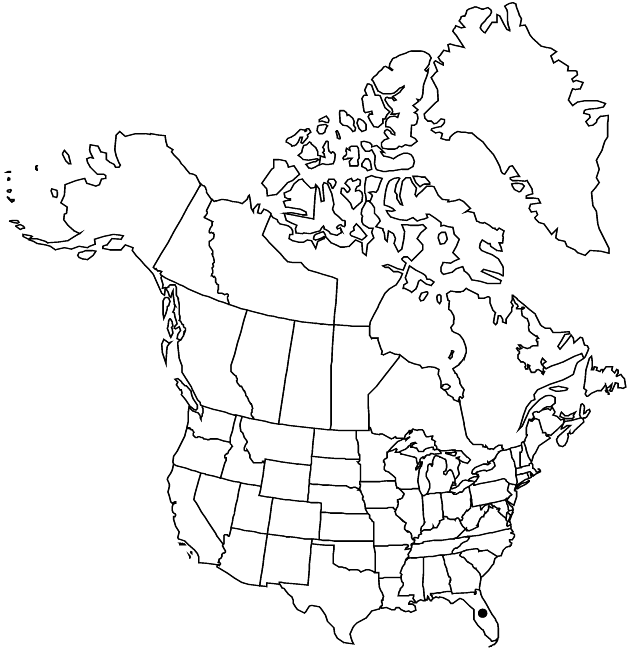Difference between revisions of "Pityopsis flexuosa"
Man. S.E. Fl., 1341. 1933.
FNA>Volume Importer |
imported>Volume Importer |
||
| (5 intermediate revisions by 2 users not shown) | |||
| Line 7: | Line 7: | ||
|year=1933 | |year=1933 | ||
}} | }} | ||
| − | |basionyms={{Treatment/ID/ | + | |special_status={{Treatment/ID/Special_status |
| + | |code=E | ||
| + | |label=Endemic | ||
| + | }} | ||
| + | |basionyms={{Treatment/ID/Basionym | ||
|name=Chrysopsis flexuosa | |name=Chrysopsis flexuosa | ||
|authority=Nash | |authority=Nash | ||
| + | |rank=species | ||
| + | |publication_title=Bull. Torrey Bot. Club | ||
| + | |publication_place=23: 107. 1896 | ||
}} | }} | ||
|synonyms={{Treatment/ID/Synonym | |synonyms={{Treatment/ID/Synonym | ||
|name=Heterotheca flexuosa | |name=Heterotheca flexuosa | ||
|authority=(Nash) V. L. Harms | |authority=(Nash) V. L. Harms | ||
| + | |rank=species | ||
}} | }} | ||
|hierarchy=Asteraceae;Asteraceae tribe Astereae;Pityopsis;Pityopsis flexuosa | |hierarchy=Asteraceae;Asteraceae tribe Astereae;Pityopsis;Pityopsis flexuosa | ||
| Line 38: | Line 46: | ||
-->{{#Taxon: | -->{{#Taxon: | ||
name=Pityopsis flexuosa | name=Pityopsis flexuosa | ||
| − | |||
|authority=(Nash) Small | |authority=(Nash) Small | ||
|rank=species | |rank=species | ||
| Line 52: | Line 59: | ||
|publication title=Man. S.E. Fl., | |publication title=Man. S.E. Fl., | ||
|publication year=1933 | |publication year=1933 | ||
| − | |special status= | + | |special status=Endemic |
| − | |source xml=https:// | + | |source xml=https://bitbucket.org/aafc-mbb/fna-data-curation/src/2e0870ddd59836b60bcf96646a41e87ea5a5943a/coarse_grained_fna_xml/V19-20-21/V20_494.xml |
|tribe=Asteraceae tribe Astereae | |tribe=Asteraceae tribe Astereae | ||
|genus=Pityopsis | |genus=Pityopsis | ||
Latest revision as of 20:03, 5 November 2020
Perennials, 20–50 cm; rhizomes 1–5 cm. Stems 1–6, ascending, sometimes reddish brown, usually simple, flexuous, slender, moderately sericeous, glabrescent. Leaves: basal equaling or shorter than cauline, persistent through winter, withering by flowering; cauline spreading to ascending, sessile, blades linear-lanceolate, 30–70 × 3–7 mm, apices acute, faces moderately sericeous, glabrescent; distal slightly reduced. Heads 3–20 per stem, in corymbiform arrays. Peduncles sparsely bracteolate, 1–11 cm, tomentose, sparsely, minutely glandular; bracteoles reduced distally. Involucres narrowly campanulate, (7–)8–11 mm (equaling pappi). Phyllaries in 4–6 series, margins hyaline, sometimes reddish distally, fimbriate (midnerves pronounced), apices acute, faces sparsely pilose, eglandular or sparsely, minutely stipitate-glandular. Ray florets 9–13; laminae 5–8 mm. Disc florets 25–45; corollas 5.5–7 mm, tubes and proximal throats sparsely puberulent, lobes 0.5 mm, glabrous or glabrate. Cypselae fusiform, 3–4 mm, ribbed (dark between ribs), faces sparsely strigose; pappi: outer of linear scales 0.3–1 mm, inner of 30–50 bristles 5.5–7 mm. 2n = 18.
Phenology: Flowering late summer–fall.
Habitat: Sandy, open soils, open pine-oak woods, clearings
Elevation: 0–50 m
Discussion
Pityopsis flexuosa is known only from the vicinity of Tallahassee.
Selected References
None.
